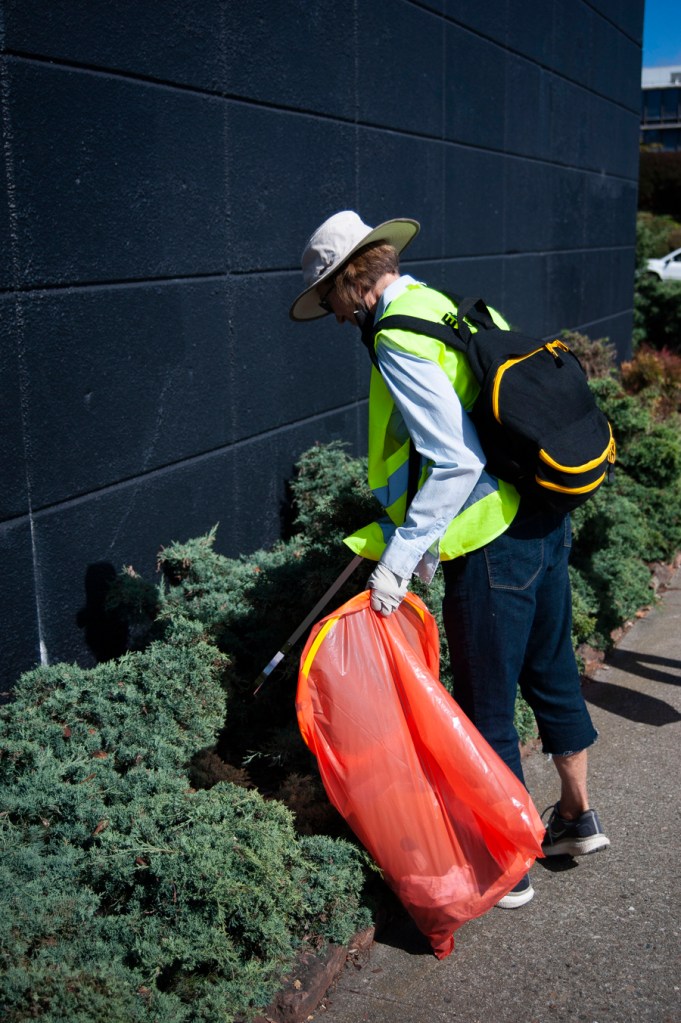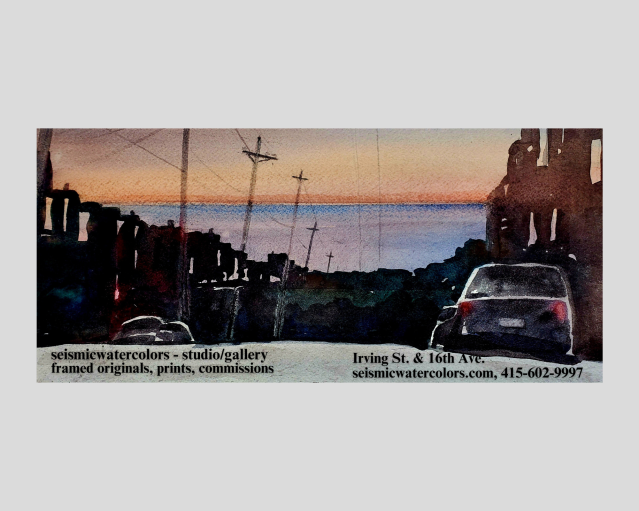By Alyson Wong
“Refuse” is a heteronym, a word that has two meanings and pronunciations, depending on how you use it.
According to the Merriam-Webster dictionary, refuse (re-FUZE) as a verb means to “express oneself as unwilling to accept.” As a noun, refuse (REF-yoos) is defined as “the worthless or useless part of something: leavings, trash, garbage.” Refusing something insists on the existence of something better. Vince Yuen is doing just that with trash.
Refuse Refuse is a grassroots campaign working to keep the streets of San Francisco clean since its inception in March 2021. Yuen found himself at the helm of this movement unexpectedly.
A Richmond District resident for nearly two decades, Yuen found himself suddenly stuck inside, like many others during the earlier part of the COVID-19 pandemic. The idea came to him to clean up some trash on his block as an activity he could engage in outside with his two young daughters, ages 5 and 7 at the time. Despite never having volunteered before, Yuen was activated to continue taking half an hour to remove the masks and to-go containers that he would see accumulating on his block.
This drew the curious attention of others and once prompted a neighbor to poke their head out from an upstairs window to ask what he was doing. Vince called up that he was cleaning up trash on the block. To his surprise, that neighbor thought it was a great idea and came down to join him right then and there. Though Yuen had no intention of continuing to clean beyond that first time with his daughters, this small act picked up momentum, especially after his block became noticeably cleaner.
Fast forward to today; hour-and-a-half cleanups are now self-organized in neighborhoods across San Francisco, from the Richmond and Sunset districts to North Beach to Dogpatch. Cleanups are posted on the organization’s website. About 600 cleanups have been organized, with approximately 6,000 unique volunteers taking to the streets demonstrating their care for the City.
At every cleanup, volunteers are provided with a bright neon-colored vest for visibility, an orange 13-gallon trash bag to put litter into, a plastic hoop ring to attach to the bag’s opening for easy pickup and an extended arm trash picker. Once geared up, volunteers go out in small groups and get to work. More than 150,000 gallons of refuse have been collected thus far, which translates to more than 11,500 full trash bags.

According to Recology, San Franciscans send about 1,100 tons of garbage to the landfill every day, which is the equivalent of about 45 semi-trucks. It is easy to think that an hour and a half wouldn’t make much of a difference amidst overwhelming numbers, but just 10 minutes alone transformed sidewalk spots substantially.
“All that is needed is time and effort,” Yuen said.
The waste picture in San Francisco is conflicting. The City has adopted key implementations, like mandatory recycling and composting in 2009 in an attempt to achieve the long-term goal of zero waste. These and other actions have earned the City a progressive reputation when it comes to litter.
However, walking the streets today would tell a different story. Jamie Kendall, who has been volunteering for the last year with Refuse Refuse and lives in the Laurel Heights area, remarks that the trash on the streets has gotten “way worse in the past five years.” On the ground, litter runs the gamut from wrappers, food, single-use containers, furniture and a variety of discarded items. Cigarette butts are the most littered item. Used needles are a common sight and need to be tagged for proper collection.
Systemic issues of homelessness, inequality, public health, lack of school and teacher funding, and public transportation all show up in the trash on the street. Yuen concedes that “though trash removal treats the symptom of looming societal issues, there’s still something nice about seeing the visual protest of someone cleaning the street and as one person, it is something you can do.”
As Refuse Refuse found its legs, Yuen asked himself: “How do other cities keep places clean?” He researched other efforts taking place around the world and discovered Green Birds – a volunteer organization that removes litter from streets in groups – that was born in 2003 in Tokyo. Tokyo has a high population density, not unlike the Bay Area, so seeing efforts like these are encouraging. Yuen discovered litter-picking groups organized around the world and was also encouraged by TidyTowns, an initiative and yearly competition started in 1958 in Ireland to keep villages and towns clean.
Yuen remarked that awareness and creating a culture of cleanliness is another important part of this work. Volunteer Sharon Esker shares that “once you see the trash you can’t unsee it.” Picking up litter is an act of civil engagement, which many see as more important now than ever.
While it may seem out of the ordinary for some people to see others removing litter from the streets, Yuen reflects, “What’s stranger is not picking up trash that we see and thinking that what we see around us is not caused by our own human behavior.”
Dylan Dullea, a first-time volunteer, shared that he first heard about Refuse Refuse through the app, Nextdoor. While currently looking for a job, he thought he would provide some of his labor as a service to the community.
“It is eye opening seeing how much trash is in the neighborhood,” Dullea said. “It feels great to be part of the clean up.”
Sharon Esker is a retiree who lives in lower Pacific Heights. She heard about Refuse Refuse’s trash cleanups through her friend Kim and has attended for the last six months after already picking up trash on her own. The two often go together and have been to the Hayes Valley and Cow Hollow cleanups as well.

“It’s fun picking up trash,” Esker said. “You get a walk in for exercise and also accomplish a good deed.” She said that people of all ages join, with some bringing their kids. Many high school and college students have also taken part.
Some businesses and merchants’ associations will also offer refreshments to volunteers for their work. Greg Gorlen, a San Francisco resident, and his mom who was visiting him from Kensington, Maryland, also came out to participate in the cleanup.
“I’m not as optimistic that cleaning up trash can solve the systemic problem of overproduction and consumption,” Gorlen said. But he joins his mom, who has been cleaning up litter for the last 10 years on her own and has continued to find this immediately gratifying.
Replace a giant boulder that might crush you under its weight with the seemingly endless trash on the hilly streets of San Francisco, and a modern-day version of the Sisyphean allegory is arguably not far off. Unlike Sisyphus however, who faced the eternal punishment of pushing a boulder up a hill in the underworld that would ultimately roll back down, many volunteers in their neon vests with bags and trash pickers work together to keep San Francisco streets beautiful; with one piece of trash at a time removed, the needle of human effectiveness against waste moves from futile to impactful.
Upcoming Refuse Refuse Richmond District Clean-up Events
Clement Street Happy Hour Cleanup. Friday, Sept. 2, 3:30-5 p.m. Help us clean up trash along Clement Street in the Inner Richmond, then stay afterwards for a drink and to meet fellow volunteers. Meet in front of Richmond Republic Draught House (642 Clement St.). All supplies provided. Stay afterward for a free round on the house and to meet fellow volunteers. Sign up on the TogetherSF Mobilize page or email info@refuserefusesf.org with event name.
KEEP Ocean Beach Clean. Saturday, Sept. 10, 10 a.m.-noon. Help us clean up Ocean Beach and the surrounding neighborhood in the Outer Richmond. Meet at Ocean Beach Cafe (734 La Playa Ave.). All supplies provided. Sign up on the TogetherSF Mobilize page or email info@refuserefusesf.org with event name.
Outer Richmond Balboa Cleanup. Friday, Sept. 16, 4-6 p.m. Help us clean up along Balboa Street in the Outer Richmond. Meet in front of Balboa Theatre (3630 Balboa St.). All supplies provided. Sign up on the TogetherSF Mobilize page or email info@refuserefusesf.org with event name.
Richmond District Cleanup. Saturday, Sept. 17. 10 a.m.-noon. Help us clean up trash in the Richmond District, then stay afterward to meet fellow volunteers. Meet in front of Internet Archive (300 Funston Ave.). All supplies provided. Sign up on this TogetherSF Mobilize page or email info@refuserefusesf.org with event name.
KEEP Ocean Beach Clean. Saturday, Sept. 24, 10 a.m.-noon. Help us clean up Ocean Beach and the surrounding neighborhood in the Outer Richmond. Meet at Ocean Beach Cafe (734 La Playa Ave.). All supplies provided. Sign up on the TogetherSF Mobilize page or email info@refuserefusesf.org with event name.
SF Village Cleanup. Thursday, Sept. 29, 10:30 a.m.-noon Help us with San Francisco Village and their senior community clean up the Inner Richmond. Meet at Rise & Grind Coffee (785 Eighth Ave.). All supplies provided and FREE coffee for volunteers. Sign up on the TogetherSF Mobilize page or email info@refuserefusesf.org with event name.
Clement Street Happy Hour Cleanup. Friday, Sept. 30, 3:30-5 p.m. Help us clean up trash along Clement Street in the Inner Richmond, then stay afterwards for a drink and to meet fellow volunteers. Meeting point TBD. All supplies provided. Stay afterwards for a free round on the house and to meet fellow volunteers. Sign up on the TogetherSF Mobilize page or email info@refuserefusesf.org with event name.
For more information, go to https://refuserefusesf.org
Categories: Environment












I wonder if having signs asking “please don’t litter” or “pick up trash” or something that addresses the root cause might help. I’ve read if you add a pair of eyes to a sign people are much less likely to break rules!
LikeLike